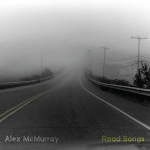Alex McMurray Road Songs
A good songwriter writes good songs. A great songwriter writes overarching poetic narratives. The songwriter as lyric poet doesn’t just turn out albums or mixes, they weave myths that touch our collective soul and seem at once personal and in synch with the human zeitgeist. Alex McMurray is such a writer, and his songs that make up Road Songs may someday be remembered as a myth of these times akin to Joni Mitchell’s Blue or Bob Dylan’s Blood On The Tracks.
The immensity contained in these songs is monumental. A lifetime of peripatetic sojourning, wandering, drifting, escaping to who-knows-where, searching the blasted landscape of the apocalypse, only to find those cold irons bound. There’s a story being told in broad strokes, but all the pieces fit together and gather momentum as the record makes its own journey into the listener’s mind.
I been around the world/ I seen the birds fall from the sky/ I seen the paper dolls fold and faded/ My o my and every drop of rain seems to wash away the pain/ and every moonless sky comes on like a lullaby.
McMurray opens the album with these words from “Around the World.” He’s been there, of course, and something about this dreadful era we’re living through has made him ruminate on his experiences and try to make some sense of them. Or maybe just to exorcise them once and for all. The characters in these songs are not autobiographical but they’re all informed by some part of McMurray’s universal soul, the visions that come to him when he hammers out his songs.
Those who know McMurray’s work might be a little shocked at the deadly serious, otherworldly tone he strikes here, but McMurray is clearly being led by his muse. Somewhere in the distance we hear an echo of Bob Dylan, a hint of Woody Guthrie, in these stories of desperate men, wandering women and doomed travelers. Like on “Cold As a Knife:”
I wanna say that the road is just a killer/ it’s long and cold and black/ I gotta see what’s over that hill / but the road will never bring me back.
There are moments when you might recognize a revenant’s version of McMurray thinking about the old days in “Hole:”
Talk about the time in Bay St. Louis/ me and old JD/ six to six for six bucks an hour/
giving it away for free/ I said “JD won’t you hand me down a bucket?”/ He just stood and shrugged/ Told me the sun ain’t ever gonna rise/ ’til this hole gets dug.
This is the music of dreams, of surreal vision, and McMurray references the unconscious world directly beginning with “These Dreams In Me.”
In “Mary Jane” McMurray goes as far as to ask the question “Did I see you in my dreams?” In this case he might have been referring to the Nice Dreams of the Cheech and Chong variety based on the title but that hardly matters. In fact he wrote the song for his mother-in-law when she passed away from cancer. This is the song that haunts me in the middle of the night when I wake up out of a deep sleep, dreaming my own stories.
The LP version of this release, which is what I’m listening to, is pressed on thick vinyl and sounds fantastic, timeless. The process of listening to side one, taking a moment, then turning the disc over to side two fills me with memories of great LPs listened to for the first time and marveled at. It’s like a book that you can’t put down, a story unspooling before your ears, enveloping your imagination, hinting at unseen worlds of experience. McMurray has always had the novelist’s touch for drawing characters and placing them in striking situations, but here the echoes of great Dylan albums like John Wesley Hardin abound, filled with the lore of the wanderer on the vast landscape of American oddball reality, searching for meaning. If side one of Road Songs sets the scene and the circumstances, side two provokes the narrative.
The narrator of “On the Streets Again”—is he an ex-con, someone who’s just left a bad relationship, or just someone who got fed up with his nine-to-five and hit the road? He’s a songwriter, who’s got: “Songs to share/ I found them up in the air/ but you can find them anywhere/ in the world that you roam.” It’s a hardscrabble road but one filled with grace and wonder for this protagonist. “I thought I seen a miracle/ I tried to make it lyrical.”
In “Off the Vine” the traveler is with someone, in a vehicle:
“We’re out there somewhere with a ways to go/ with all the night music on the radio…/
might be Memphis could be Cheyenne/ I can’t recognize this highway, man…/
might go east and might go west/ take the wheel I got to get some rest…/
not lost yet but there’s still time/ let’s both hang I think we might be falling off the vine.”
“Same Way Down” is another road song, this one about the prodigal’s return:
“She said I wouldn’t lie when I walked by/ the whole damn town just looked away/
so I got out for good just as fast as I could/ ‘til finally I came back one day/
a spark then a flame and I heard my name/ he said “Mary what have you done my daughter?”/ I don’t feel no shame/ ‘cause everybody knows my name/
the way I come on up/ I got to go the same way down.”
“Drifter’s Lament” is the epic poem that finishes the album, a song about the hobo’s loss of a beloved sidekick, the cry of lonesome travelers over the years, resonating right down to the present day of the rail-riding wanderers who populate New Orleans:
“Woke up this morning/ and I lost my only friend/ and now I’m on the road alone/
an out-front drifter and I’ll be until the end/ no good idea where I’m going…/
so goodbye, goodbye, goodbye, goodbye/ I’ll see you when I can/
take flight, take flight, take flight, take flight/ over to that other land.”
This is an album you have to live with. It keeps coming at you, relentlessly, in the burnt orange landscapes of drifters’ sunsets and the bleary east wind mornings capping endless all-nighters. McMurray’s voice is somber and removed, as if he’s in awe of these stories himself, and though it’s a very solitary enterprise there are a few deft touches added by close friends like Susan Cowsill, Carlo “Mr. Natural” Nuccio, Glenn Hartman, Casey McAllister, Matt Rhody, Jason Jurzak, Rick Nelson, Jimbo Mathus, Michael Mehiel, Jeff Treffinger and a member of the chorus from beyond the grave, Spencer Bohren. It’s tempting to think that Alex’s interaction with Spencer in his last days as part of the Write Brothers informs the serious tone of Road Songs.
In the end, the record makes me think of my old friend Paul Williams, Crawdaddy founder and the reason I’m writing this today. Paul was able to look at records as treasure chests full of hidden meanings and life lessons, and he was able to translate those thoughts brilliantly into words, working at what he called the miracle factory. McMurray has turned out a sturdy artifact from the miracle factory, a recording we can live with and learn from. Alex even offers a little homily in the last verse of “Around the World”:
Don’t spend your love too fast/ just save a little for the end/ don’t make your troubles last/
or make them feel like your friends/ ‘cause every drop of rain/
is going to see you through the pain/ and every moonless sky/ is going to be your lullaby.









